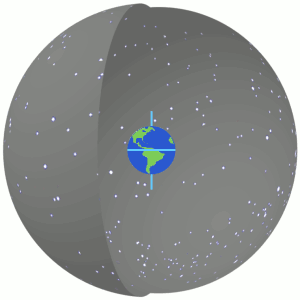|
Declination (other)
Declination is a noun form of the verb ''decline'' and may refer to: * Declination, coordinate used in astronomy * Magnetic declination, angle that must be added or subtracted in the use of compass for geography * Grid declination, angle between the compass north and north direction of the map coordinate grid * Clinamen, a concept in early atomic theory See also * Declension In linguistics, declension (verb: ''to decline'') is the changing of the form of a word, generally to express its syntactic function in the sentence by way of an inflection. Declension may apply to nouns, pronouns, adjectives, adverbs, and det ..., use of case in linguistics * Decline (other) {{Disambig ... [...More Info...] [...Related Items...] OR: [Wikipedia] [Google] [Baidu] |
Declination
In astronomy, declination (abbreviated dec; symbol ''δ'') is one of the two angles that locate a point on the celestial sphere in the equatorial coordinate system, the other being hour angle. The declination angle is measured north (positive) or south (negative) of the celestial equator, along the hour circle passing through the point in question. The root of the word ''declination'' (Latin, ''declinatio'') means "a bending away" or "a bending down". It comes from the same root as the words ''incline'' ("bend forward") and ''recline'' ("bend backward"). In some 18th and 19th century astronomical texts, declination is given as ''North Pole Distance'' (N.P.D.), which is equivalent to 90 – (declination). For instance an object marked as declination −5 would have an N.P.D. of 95, and a declination of −90 (the south celestial pole) would have an N.P.D. of 180. Explanation Declination in astronomy is comparable to geographic latitude, projected onto the celestial sphere, and ... [...More Info...] [...Related Items...] OR: [Wikipedia] [Google] [Baidu] |
Magnetic Declination
Magnetic declination (also called magnetic variation) is the angle between magnetic north and true north at a particular location on the Earth's surface. The angle can change over time due to polar wandering. Magnetic north is the direction that the north end of a magnetized compass needle points, which corresponds to the direction of the Earth's magnetic field lines. True north is the direction along a meridian towards the geographic North Pole. Somewhat more formally, Bowditch defines variation as "the angle between the magnetic and geographic meridians at any place, expressed in degrees and minutes east or west to indicate the direction of magnetic north from true north. The angle between magnetic and grid meridians is called grid magnetic angle, grid variation, or grivation." By convention, declination is positive when magnetic north is east of true north, and negative when it is to the west. '' Isogonic lines'' are lines on the Earth's surface along which the declination ... [...More Info...] [...Related Items...] OR: [Wikipedia] [Google] [Baidu] |
Grid Declination
Magnetic declination (also called magnetic variation) is the angle between magnetic north and true north at a particular location on the Earth's surface. The angle can change over time due to polar wandering. Magnetic north is the direction that the north end of a magnetized compass needle points, which corresponds to the direction of the Earth's magnetic field lines. True north is the direction along a meridian towards the geographic North Pole. Somewhat more formally, Bowditch defines variation as "the angle between the magnetic and geographic meridians at any place, expressed in degrees and minutes east or west to indicate the direction of magnetic north from true north. The angle between magnetic and grid meridians is called grid magnetic angle, grid variation, or grivation." By convention, declination is positive when magnetic north is east of true north, and negative when it is to the west. ''Isogonic lines'' are lines on the Earth's surface along which the declination h ... [...More Info...] [...Related Items...] OR: [Wikipedia] [Google] [Baidu] |
Clinamen
Clinamen (; plural ''clinamina'', derived from , to incline) is the unpredictable swerve of atoms in the atomistic doctrine of Epicurus. This swerving, according to Lucretius, provides the " free will which living things throughout the world have". Lucretius never gives the primary cause of the deflections. According to Lucretius, the unpredictable swerve occurs "at no fixed place or time": When atoms move straight down through the void by their own weight, they deflect a bit in space at a quite uncertain time and in uncertain places, just enough that you could say that their motion has changed. But if they were not in the habit of swerving, they would all fall straight down through the depths of the void, like drops of rain, and no collision would occur, nor would any blow be produced among the atoms. In that case, nature would never have produced anything. In his 1704 work '' Tale of a Tub'', Jonathan Swift satirized the atomistic theory of Epicurus: Epicurus modestly hoped th ... [...More Info...] [...Related Items...] OR: [Wikipedia] [Google] [Baidu] |
Declension
In linguistics, declension (verb: ''to decline'') is the changing of the form of a word, generally to express its syntactic function in the sentence by way of an inflection. Declension may apply to nouns, pronouns, adjectives, adverbs, and determiners. It serves to indicate grammatical number, number (e.g. singular, dual, plural), grammatical case, case (e.g. nominative case, nominative, accusative case, accusative, genitive case, genitive, or dative case, dative), grammatical gender, gender (e.g. masculine, feminine, or neuter), and a number of other grammatical categories. Inflectional change of verbs is called Grammatical conjugation, conjugation. Declension occurs in many languages. It is an important aspect of language families like Quechuan languages, Quechuan (i.e., languages native to the Andes), Indo-European languages, Indo-European (e.g. German language, German, Icelandic language, Icelandic, Irish language, Irish, Baltic language, Lithuanian and Latvian, Slavic lang ... [...More Info...] [...Related Items...] OR: [Wikipedia] [Google] [Baidu] |

